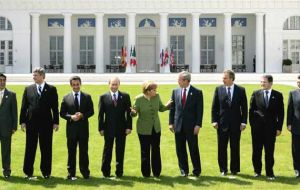MercoPress. South Atlantic News Agency
G8 leaders agree to substantial cut in greenhouse emissions
 G8 leaders family photo in Heiligendamm
G8 leaders family photo in Heiligendamm Leaders of the leading industrialized nations G8 meeting in Germany agreed to seek “substantial” cuts in CO2 emissions in an effort to tackle climate change. German Chancellor Angela Merkel said the G8 would negotiate within a United Nations framework to seek a replacement for the Kyoto Protocol by the end of 2009.
Although no mandatory target was set for the cuts, Ms Merkel's preference for a 50% emissions cut by the year 2050 was included in the agreed statement as was that developing nations should also help by cutting their emissions. Ms Merkel described the agreement as the "most important decision for the coming two years" and sends "an important signal" to the world. Although not legally binding "no one can escape this declaration". The German Chancellor said it was a great success that all eight of the G8 countries now acknowledge the results of the UN most recent climate report. The report by the Intergovernmental Panel on Climate Change found that global warming is largely the result of human activity and only by limiting carbon dioxide emissions will it be possible to stop global warming. In order to avoid wide-ranging consequences, international experts believe that it is absolutely essential that global warming be limited to 1.5 to 2.5 degrees Celsius. Scientists say that deep reductions in greenhouse gas emissions are necessary to achieve such limits. The environment ministers of the United Nations Framework Convention on Climate Change can now negotiate details of how these goals regarding global reductions are to be achieved. A post-Kyoto Protocol regulation is to be agreed during the Global Climate Change Conference. In parallel to the UN process, groups of countries have the possibility of reaching additional agreements on how the common goal is to be achieved. In future the G8 also want to use new financial tools to support climate protection projects in the developing countries, for example the proceeds from the auctioning off of emissions rights. It is also clear that all countries bear joint responsibility for reducing greenhouse gases, but in different ways. The Chancellor highlighted the leading role the Group of 8 had to play. According to an extract from the agreed text published on the G8 website, the leaders agreed to take "strong and early" action. "Taking into account the scientific knowledge as represented in the recent IPCC [Intergovernmental Panel on Climate Change] reports, global greenhouse gas emissions must stop rising, followed by substantial global emission reductions," the text says.




Top Comments
Disclaimer & comment rulesCommenting for this story is now closed.
If you have a Facebook account, become a fan and comment on our Facebook Page!